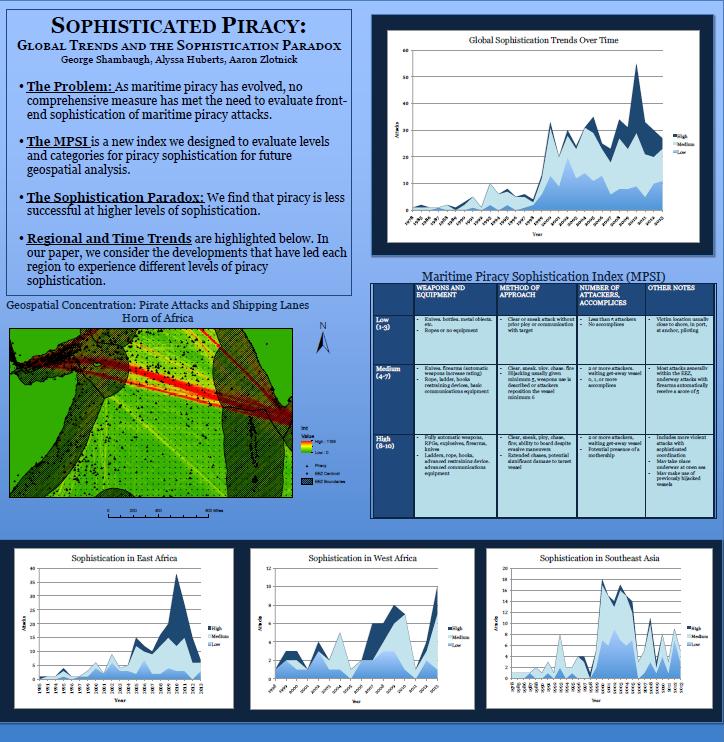Students Present at International Studies Association Conference


Alyssa Huberts (Class of 2014) and Aaron Zlotnick (Class of 2013) participated in the annual meeting of the International Studies Association in Toronto. The students have been working with Professors George Shambaugh and Raj Desai on a project to evaluate the impact of political and economic change on maritime piracy. Part of this project involved creating a Maritime Piracy Sophistication Index (MPSI).
At the ISA conference, Alyssa and Aaron presented a poster introducing the MPSI and highlighting some of their findings. They did a superb job answering questions for more than an hour from top scholars in the field — including one whose work they criticized in the paper — as well as practitioners — including a sailor whose ship had been attacked. The students were among a very small number of undergraduates at an international conference with over 3,000 scholars and practitioners.
Creating the MPSI index required a close reading and assessment of over 500 randomly selected anti-shipping activity reports. Alyssa and Aaron played a central role in reviewing these reports, creating the index and writing a paper that highlights some of the insights gained by using the MPSI. They found a paradoxically inverted relationship between the levels of sophistication and success — what they call the Sophistication Paradox — as well as significant variations in the sophistication of piracy attacks over time and across different regions around the globe.

Project Description:
This paper examines variation in the sophistication of modern maritime piracy attacks across regions and over time. To examine the nature of contemporary maritime piracy, we created and applied a Maritime Piracy Sophistication Index (MPSI). Our index focuses on front-end sophistication by evaluating pirate activities leading up to and throughout an attempted attack. It encompasses a wide range of maritime criminal activity against ships in port, at anchor, piloting, in territorial waters and on the open ocean.
Our paper presents three novel findings with respect to the relationship between the level of sophistication and the probability of success, regional variation in the type of attacks, and evolutionary trends in maritime piracy over time.
In order to analyze piracy attacks, we created the Maritime Piracy Sophistication Index (MPSI), which has an ordinal scale that increases with sophistication and that ranges in value from 1 to 10. Sophistication is more broadly indexed by three sophistication categories: low, medium, and high. We randomly selected 500 attacks and each was given a sophistication value based on the information provided and our index criteria.
Findings:
The Sophistication Paradox:
Most significantly, we discover that piracy exhibits an effect we deem the “Sophistication Paradox,” in which more sophisticated attacks tend to have lower probabilities of success than do their less sophisticated counterparts. The Sophistication Paradox is partially explained by the tradeoff between the more ambitious and difficult nature of high sophistication attacks and the greater tactical capabilities exhibited by pirates conducting such attacks. These opposing dynamics of sophistication tend to cancel each other out, leading to lower success rates and provide a partial key to unlocking the Sophistication Paradox.
Variation across regions and over time:
Aggregate levels of piracy have increased dramatically from 1999 to 2013. Since 2007, high sophistication attacks have become more frequent, with low sophistication attacks declining and medium sophistication attack occurrence remaining relatively constant.
Different regions have experienced booms in piracy, or “hot spots”, at different times. Southeast Asia experienced most of its piracy between 1999 and 2005, while East Africa currently accounts for the majority of pirate attacks. There is also a shift of piracy propensity from East Africa to West Africa, with a new potential hot-spot emerging in the Gulf of Guinea.
In East Africa, piracy as a whole has drastically increased since 2006, peaked in 2010, and was characterized by a large increase in the number of high sophistication category attacks.
In West Africa, the number of attacks is more modest on the whole, though growing since 2000 with varying increases in sophistication categories for different years.
Southeast Asia seems perhaps to have passed its peak period of pirate activity since piracy levels dropped precipitously in 2006 and piracy in this region continues to be predominantly characterized by low and medium level sophistication attacks.
We conclude that any further efforts to understand or combat piracy must keep these developments in mind and must, critically, be geospatially rooted.
Examples:
While presenting our poster, two examples proved particularly useful for illustrating the Maritime Piracy Sophistication Index in action. The now famous April 2009 hijacking of the Maersk Alabama, captained by Richard Phillips, is a characteristic example of a high sophistication attack, while, on the opposite end of the spectrum, an incident of in port robbery is a typical example of a low sophistication attack.
